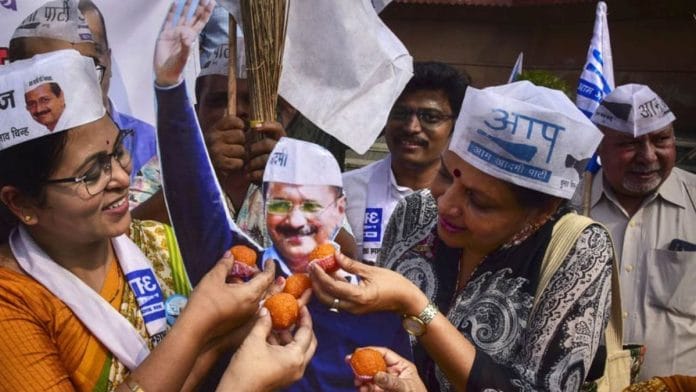The high-decibel elections for the Municipal Corporation of Delhi ended with Aam Aadmi Party clinching the majority. With this victory, AAP ushers in a ‘double-engine’ government, currently the most enthusiastically promoted governance format.
Not just Delhi, rule over two successive layers of administration by the same political party is valued by voters across India. A similar ‘double-engine’ has been functioning for the last 10 years under the Trinamool Congress (TMC) dominated Kolkata Municipal Corporation (KMC). But despite its popularity, the ‘double-engine’ juggernaut has the potential to drift civic bodies from basic service delivery responsibilities as enshrined in the 12th Schedule of the Constitution. Local municipal governments may shift their focus to areas that are the state government’s priorities and neglect important issues in their wards. It can weaken India’s federal structure and prove disadvantageous for efficient councillors from the opposition.
How TMC transformed its failure
The last KMC elections were held at the end of 2021, and TMC won 134 out of 144 wards. It is doubtful, though, that this landslide victory was because of significant improvements in basic services such as water supply, drainage, road cleaning and garbage collection. The overall popularity of TMC in West Bengal, much of which was gained due to efficient Covid-19 management, was also manifested in its remarkable win in the state assembly elections. It is this popular wave that benefitted TMC in the KMC elections.
To understand the relationship between political domination and the discharge of responsibilities of KMC councillors, we surveyed the poorest regions, or slums, of 20 wards in Kolkata from September 2021 to March 2022. TMC won in all survey wards in 2021. TMC had managed to transform its failure in four KMC wards in 2015 into victories in 2021. However, these wins were not due to the improvement of essential services.
Also read:
More political authority, fewer returns
Most slum dwellers said that water supply conditions had remained virtually the same for five years: 72 per cent respondents perceived that it was the same as before, 21 per cent perceived a marginal improvement, and 7 per cent experienced a deterioration. Drainage services, too, remained unchanged for 43 per cent slum dwellers, while 11 per cent said they had deteriorated. Waste collection services remained the same for 84 per cent slum dwellers, while others perceived a marginal improvement over five years. Furthermore, in wards where TMC won by a higher margin, slum dwellers complained more about insufficient water supply.
An earlier study on the same slums in 2011 by Tirthankar Nag and me, published in Development Policy Review in 2016, shows a reverse result, meaning the higher the margin of ward winner in KMC elections, the lesser the slum dwellers complained about water insufficiency. This contradiction of results with the present study can be attributed to the lower political dominance of TMC in 2011 in both West Bengal and KMC, compared to 2021. It implies that when the party’s political authority is higher in the state, the municipal corporation dominated by the same political party delivers less.
Slum dwellers were dealt a massive blow due to inflation in the post-pandemic period. As per the Reserve Bank of India, the Urban Consumer Price Index increased by 12.41 per cent between 2019-20 and 2021-22. Overall, sum dwellers experienced a 19 per cent increase in expenses during the post-pandemic (Sept 2021 – March 2022) period compared to the pre-pandemic (before March 2019) period. Overall monthly consumption expenditure (nominal) increased for almost all households. However, considering the price rise, the actual overall consumption expenditure fell for around 30 per cent of households.
Interestingly, the loss of real consumption was lesser in wards where TMC domination was higher. It implies that councillors were rewarded more when the consumption needs of slum dwellers were met rather than when basic services were delivered.
TMC councillors were in a better position to improve the consumption of the poor by working in tandem with the state government. Food and employment were provided during the pandemic, which TMC councillors could bargain more. Even if a TMC councillor were not very active, they would get spillover benefits of consumption smoothing facilitated by the state government. Harnessing the same political advantage was almost impossible for councillors from a different political party, even if they had been very active. This discourages good public service delivery by a councillor and constrains local governments’ role as self-governing institutions. Similarly, ‘double-engine’ state governments are subordinated by the central government, defeating the virtues of federalism.






